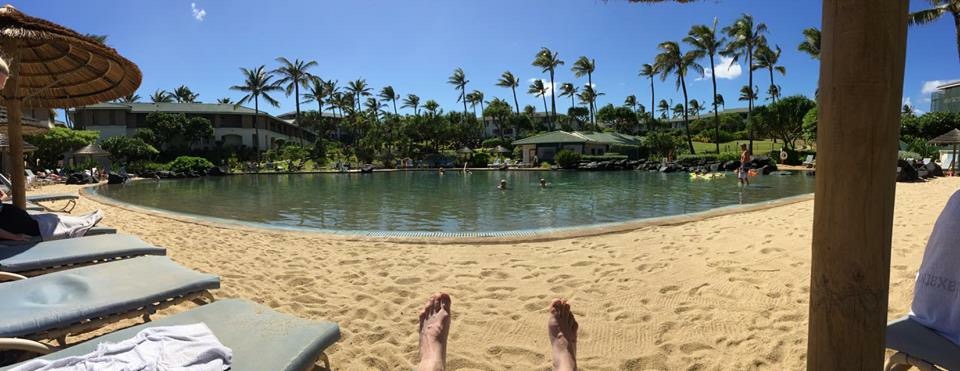6 Vital Lessons I Learned By Taking A Vacation
There are some life lessons we only have to learn once. And then there are others. Like, how sometimes life gets so busy that we forget to take a break. Or, we just choose to stay in the wheel, grinding out the day-to-day routine until we are forced to quit. Whether it is our body who says “STOP!” or our immune system is tired and we end up with a raging flu, you know when you have to rest a while.

The challenge: knowing I needed to disconnect. I mean, REALLY disconnect. I had been working 7 day weeks for months, with little respite in between. Yes, my business was growing, but I knew I could only hold out so long in that work mode. When I made the decision not to take my laptop with me and to turn off my email from the phone I knew I would need during the trip, I knew I had to do it, but I didn’t know the valuable lessons I would learn in the process.
These 6 lessons I learned really do need to be shared, because they are vital to maintaining balance and a healthy work lifestyle.
Lesson 6: Don’t procrastinate. Plan ahead. –
I know I always work well with a deadline. How about you? As soon as you know where you’re going and when you’ll be gone, a goal is set to remove yourself from the picture during that time.

Image courtesy of Pixabay and StartupStockPhotos
Begin reviewing projects, client communications, systems and team coverage needs at least 4-6 weeks ahead of time. Are there any client communications or projects that will need dedicated support coverage while you’re away? Who will be there to cover? Which of your clients need a heads-up?
About 2 weeks out, begin setting up guidelines for team coverage – who will report to whom and who is responsible for what. Make sure project assignments and what is needed is crystal clear.
2-4 days before you leave, setup and schedule your out of office email auto-responder and your out going voicemail box message, backup your computer system and devices, wrap up and delegate any final projects or responsibilities, and finish up your communications.
The day before you leave, you should feel great about turning off your computers and turning off emails, phone and text.
Lesson 5: It’s ok – even good – to talk about it.
Not only does talking about it give you even more reason to look forward to it, it also helps you process and announce your time away from the office to those you work with.

Image courtesy of Pixabay and CreativeProphet
It doesn’t mean you tell the whole world, splash it all over social media or publicly offer up the information that you won’t be home for a week. But, for those you trust and who depend on you, it’s good to give them the head’s up.
I started telling all my associates, team members and clients that I would be gone for a week WELL in advance – as in, 4 weeks before, or more. And, guess what, they respected it. Besides only one text message I received from a business owner I work with who felt they needed urgent help, I didn’t use my mobile devices for work at all. My cell phone was only used for coordinating activities with the family that was all there with my husband and I, and of course, the occasional social update on Instagram or Facebook.
It’s not a bad thing to share how much you’re looking forward to a vacation, or to post a few pictures while you’re out so your online friends and fans will know you’re enjoying yourself. Just be sure your privacy isn’t compromised. Review your social profile security, location services, and privacy settings before you leave and you won’t need to worry about who’s seeing your updates or know where you live.
Lesson 4: It can be done.
 Not only did I make the conscious decision not to take my computer AND to turn off my email from my phone, I actually stuck to it. And, guess what? Nothing catastrophic happened while I was disconnected.
Not only did I make the conscious decision not to take my computer AND to turn off my email from my phone, I actually stuck to it. And, guess what? Nothing catastrophic happened while I was disconnected.
I made the decision to schedule a mid-week check-in with my team, which wasn’t really necessary, but it was good for them, and we made it quick, so it was good for me too. The only piece of advice I have when and if you must schedule a team call, is to make it concise, know what updates you’ll need and outline those before you leave, and be sure you set a time that works for the timezone you’ll be in. I forgot to remind my team that Hawaii was 3 hours behind Pacific Coast time. So when Bren called at 7am on Wednesday, I was slightly jarred out of bed. My mistake.
Lesson 3: It opens the mind.
 Letting go of responsibility is freeing when you plan ahead and know you don’t have to worry about the day-to-day routine, and the weight of responsibility opens. Even if you are determined to force yourself to let go, that act will release the mind to explore thoughts and ideas and places differently, more, even better. It makes way for the brain to rest and ideate, contemplate, and learn new things.
Letting go of responsibility is freeing when you plan ahead and know you don’t have to worry about the day-to-day routine, and the weight of responsibility opens. Even if you are determined to force yourself to let go, that act will release the mind to explore thoughts and ideas and places differently, more, even better. It makes way for the brain to rest and ideate, contemplate, and learn new things.
Wrapping up business chores prior to leaving and fully disconnecting give me space to wonder about new possibilities – something I hadn’t scheduled time to do for a long while due to the workload involved with the growth of Propel.
It also let me wander – through jungles to the tops of mountains, under waterfalls, onto majestic beaches, and into turtle inhabited waters. It let me rest and explore a new place in the world in a way I hadn’t ever done.
I read inspiring magazines cover-to-cover, and articles that made my head think in a new way. And, upon returning home, there were a series of doors opened to me that I had capacity and ability to consider, discuss and thoroughly think through.
Lesson 2: It is absolutely necessary
 Taking time off is absolutely, undeniably vital to being successful in business, family, leadership, and I believe, life in general. And for that reason, it needs to be a regular priority.
Taking time off is absolutely, undeniably vital to being successful in business, family, leadership, and I believe, life in general. And for that reason, it needs to be a regular priority.
Admittedly, I tend to be (and people know me as) a busy business owner that works a lot, and through weekends most weeks. It’s not just the nature of the machine I’ve been building since 2009 either. I have made other people, other projects and initiatives more important than my own mental and physical health, yet I’ve always known that taking a day each week to rest can be just as beneficial as taking a whole week of vacation. Somehow it got away from me.
 If we don’t give our mind a chance to slow down or stop on a regular basis, it will get too full to hold more, and that’s when health issues can creep in. We can really only absorb so much before we will be forced to clear space, process, and make room for new, more, better. It’s a renewing and recharging process that can’t go unattended.
If we don’t give our mind a chance to slow down or stop on a regular basis, it will get too full to hold more, and that’s when health issues can creep in. We can really only absorb so much before we will be forced to clear space, process, and make room for new, more, better. It’s a renewing and recharging process that can’t go unattended.
I believe a day each week is the very minimum amount of workload rest we should take, which is why it is now part of our values at Propel. When I returned from my October 2015 Vacation to Kauai I came back re-energized and resolved to make Saturday sessions a special exception, and to not work on Sunday because I need it. And because owners and managers should lead by example.
Lesson 1: Make vacation a part of my business planning for the next year.
 Now that I know and have proven to myself that taking a week of vacation is possible, now that I understand the process of disconnecting without being tethered to technology or responsibility, I know it must become part of my annual planning process. The week of disconnect was so beneficial and not as scary as I thought – so why isn’t it something I expect for and plan for each year?
Now that I know and have proven to myself that taking a week of vacation is possible, now that I understand the process of disconnecting without being tethered to technology or responsibility, I know it must become part of my annual planning process. The week of disconnect was so beneficial and not as scary as I thought – so why isn’t it something I expect for and plan for each year?
Whether that means it happens once, twice or four times each year, once each quarter, remains to be seen. All I know is that one week off is a necessity and two weeks is my goal. So, even if I don’t know exactly which two weeks, and lodging and flights aren’t booked today, opening my mind now and preparing to receive those weeks as a gift will help me take the first steps in making it a reality.
Stay tuned for my annual business planning preparation post coming in a couple weeks. Until then, begin thinking about the steps you can take to start moving into a regular routine of taking a day off or a vacation that requires you to get away from the office for 5 business days.
Have you experienced something similar? I’d love to hear what lessons you’ve learned throughout your years relating to taking time off and how you integrate balance into your professional life. Please share in the comments below.
Enjoy the full gallery here:
- Just where I should be
- Encounter with waves courtesy Hurricane Joaquin
- Bali Hai sunset
- Cool ocean friends
- In true family fashion…
- Stunning beauty
- Grand adventures
- Exploration!
- Awesome sunsets
- love-ly walks on the beach
- Lush
- My husband knows how to relax!
- My honey and my niece feed the koi
- Cousin’s hiked to Queen’s Bath
| KEYWORDS:
Text |
CATEGORY:
Category |















A really powerful lesson here… thanks for sharing it!
Beautiful post, Jamie! Your description and photos were so refreshing. Reading this brought peace to my soul. Recently, Tim and I (married for 35 years) went on a combined romance-and-business retreat in Central Oregon. We rested, swam, rode a tandem bike, and strategized. It was so refreshing. Going off the grid feels so good, doesn’t it?! I’ve decided to take the “Selah” one step further: I’m taking off one complete business day a week to spend in intimacy with Christ. I’m praying for your business retreat. I can’t wait to read the post that follows.